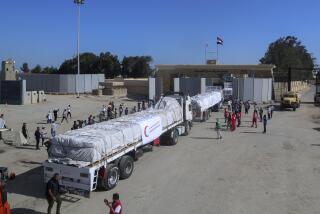Helping Libya help itself
With Moammar Kadafi on the run, attention has turned to the reconstruction and stabilization of Libya in the months and years ahead. The United States should participate in that task, but it has neither the resources nor the political capital to engage in elaborate nation-building on the model of what it has been doing in Afghanistan for a decade.
Last week, representatives of more than 60 countries gathered in Paris to discuss how to encourage Libya’s transition from a virtual monarchy to a democracy. That will cost money. Among other things, in assisting anti-Kadafi rebels, NATO caused damage to Libya’s physical and political infrastructure and owes compensation.
We were opposed to the creation of a no-fly zone, worrying that U.S. involvement in airstrikes on Libya would enmesh this country in a third war. Fortunately, U.S. participation in NATO airstrikes wasn’t accompanied by any commitment of ground forces, something that would have been a violation of a U.N. Security Council resolution in any event.
One question now is whether and to what extent the United States should provide military trainers to Libya in the case of further hostilities involving Kadafi supporters. That would be a bad idea. Unlike airstrikes, the presence of U.S. forces on Libyan soil runs the risk of a prolonged presence and escalating involvement.
Economic assistance to help rebuild and stabilize the country is another matter. Libya can benefit from resources of its own for relief and reconstruction, including billions of dollars in frozen assets released by the United States, France and Britain. Still, the U.S. should make additional economic and humanitarian assistance available. (Some is already being provided by the U.S. Agency for International Development.)
The people of Libya will see the overthrow of Kadafi as a blessing only if it produces political freedom and economic sustenance. The United States can help further both goals, but not at the barrel of a gun.
More to Read
A cure for the common opinion
Get thought-provoking perspectives with our weekly newsletter.
You may occasionally receive promotional content from the Los Angeles Times.










